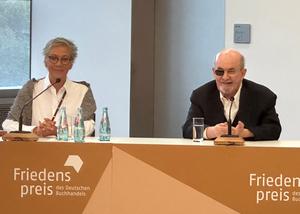 In only his third public appearance since being attacked and nearly killed last August, Salman Rushdie said this morning at a press conference at the Frankfurt Book Fair that "it's easy in the present day to have a tragic sense of life because the world is not in great shape. I've always found myself to be almost unreasonably optimistic about the world. Writing is a kind of optimism. Dedicating yourself to several years to make a book is an optimistic act--that somebody will read it in the end."
In only his third public appearance since being attacked and nearly killed last August, Salman Rushdie said this morning at a press conference at the Frankfurt Book Fair that "it's easy in the present day to have a tragic sense of life because the world is not in great shape. I've always found myself to be almost unreasonably optimistic about the world. Writing is a kind of optimism. Dedicating yourself to several years to make a book is an optimistic act--that somebody will read it in the end."
Rushdie said that after what has "obviously been a difficult year, I'm happy to be back in reasonable health." He also expressed deep gratitude to the doctors who treated him and conducted the nearly nine-hour operation that, he said, "saved my life." He stated that although he thought "temperatures had cooled," the attack was "a pretty harsh and sharp reminder" about the fatwa that has hung over him since 1989. "I'm sorry it happened, and I'm fortunate to be here."
Rushdie noted that only 10 days ago, he finished Knife: Meditations After an Attempted Murder, which will be published in April. He said it was "impossible to write anything else. It would seem absurd to write something else until I had dealt with this subject."
 |
|
| Börsenverein chair Karin Schmidt-Friderichs with Salman Rushdie. | |
The press conference took place under extraordinary security precautions, even for Frankfurt, and was in connection with the German Peace Prize, given by the Börsenverein, the German book industry association. Rushdie called the prize "enormously important... many of the previous winners are friends of mine who I admire. It's amazing to join them." In a reference to the presentation of the prize at a ceremony this Sunday at St. Paul's Church in Frankfurt, he said, "I'm looking forward to going to church on Sunday, which is a thing you never heard me say before."
At the press conference, the chair of the Börsenverein, Karin Schmidt-Friderichs, said that Rushdie is being honored because "we see him not only as a great, great storyteller but also a political person who fights for human rights and the freedom of expression, and fights in the most peaceful way you ever can--with words."
Speaking about the situation in the Middle East, Rushdie said, "I'm against war. In war, innocent people die, and the truth becomes a casualty, making it hard to know what is actually happening. I'm filled with horror. I'm filled with horror about the attack by Hamas. I'm filled with foreboding about what Mr. Netanyahu might do in return. I hope there can be a cessation of hostilities at the earliest point."
Rushdie lamented the postponement of the presentation of the LiBerature Prize to Palestinian author Adania Shibli, which was supposed to have taken place during the fair and was one of the reasons that some Arab and Muslim publishers decided not to attend the fair. "I have great sympathy for her position and what's happened to her," he said, adding that he hopes the "postponement" of the award presentation is "not a euphemism." He suggested new plans to present the award be made immediately.
Rushdie expressed anew his unequivocal support of free expression, saying, "I'm not a fan of the burning of books, whatever the book may be." He noted that the famous quotation from Heinrich Heine--"Where they burn books, in the end they also burn people," from his 1821 play Almansor: A Tragedy"--was in reference to the Quran. "I detest the idea of book burnings, and Germans of all people know why. We know what followed from book burnings in this country." But he said he doubted there should be any laws against book burnings "because that would be a way to reintroduce a blasphemy law" in Western countries.
In general, Rushdie said, there are two major threats in the world to literature and freedom of expression: authoritarianism and religious fascism. Democracy is in danger, he said, stating, "Those of us who have lived in the last decade in the United States through the madness of the Republican Party face the fact that it's very worrying that one of the major political parties in the United States seems to have departed from democratic values and moved to a kind of culture of personality." This is happening elsewhere in the world, he continued, where many "mini Trumps are emerging."
Rushdie said it is not the role of literature to overcome political threats: "Literature shows the world as a rich and complex place, which is opposite of a narrow, bigoted view. There is no such thing as a good bigoted book. Literature shows us a world of openness and variety and therefore tolerance." He called "polemics very bad for literature. I don't like books that tell me what to think. I like books that make me think."
While he mentioned several government efforts to censor and intimidate writers, Rushdie said that a kind of self-censorship is also dangerous. "I do have the impression that there is an uncertainty among young writers about what they're allowed to write about. Not only for political reasons but for social and cultural reasons. My view is that everybody can write about everything. If that's not true, then the art of the novel ceases to exist.... If we're in a world where only women can write about women and only people from India can write about people from India and only straight people can write about straight people, etc., then that's the death of the art. The whole point about the novel is that you invent the world that is not, and that includes inventing people who are not like yourself. If all you can do is invent people like yourself, that's nothing." --John Mutter

